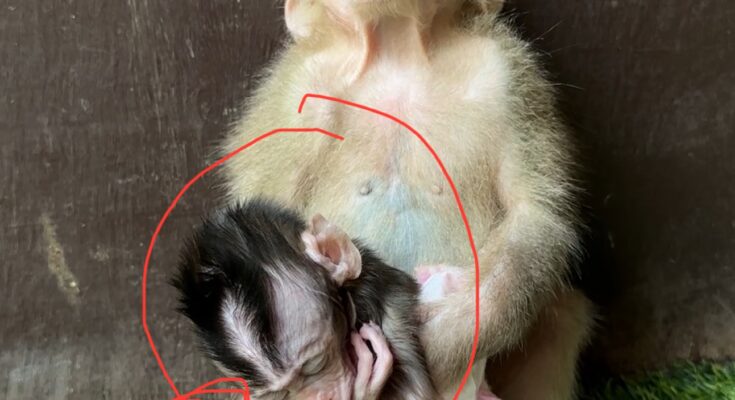In the heart of a lush tropical forest, where vibrant birds sing and leaves rustle gently in the wind, a heartbreaking scene unfolded one warm afternoon. A tiny baby monkey, no older than a few weeks, sat quietly on a low branch, his eyes heavy with exhaustion and his stomach painfully empty. He was so hungry for milk that, in his weakness, he eventually drifted into a restless sleep—alone and vulnerable.
This little monkey, whose fur was still soft and patchy from youth, had been separated from his mother days earlier. Whether through a tragic accident, human interference, or the chaos of a predator’s attack, no one could say. But the result was the same: he was now alone in a vast forest, unprepared to fend for himself. Without the warm comfort of his mother’s arms and the nourishment of her milk, he was quickly losing strength.
Observers from a nearby wildlife rescue center had been monitoring the baby from a distance, unsure whether to intervene. In the wild, sometimes mothers return, and human involvement too soon can do more harm than good. But as the hours stretched into a full day, the baby monkey’s condition became alarming. He let out weak cries, searching the canopy with desperate eyes. His little hands gripped branches with fading energy, and his lips smacked together, mimicking the instinctual action of nursing.
Then came the moment that broke the hearts of those watching. With no energy left to cry or even move, the baby monkey curled up in a small crook of the tree, head resting on his tiny arm. His eyelids drooped and finally closed, not from comfort, but from sheer exhaustion and hunger. He had been so desperate for milk—so overcome by the longing for nourishment and safety—that sleep claimed him before help arrived.
It was a moment of both sadness and urgency. Rescue workers rushed in gently, cradling the little monkey with care. His breathing was slow, but steady. His body, though frail, still had life in it. They wrapped him in a soft cloth and rushed him to a nearby animal rescue facility, where veterinarians administered warm milk through a tiny bottle.
The baby monkey stirred slightly as the first drops touched his tongue, instinctively beginning to suckle. It was a small sign of hope.
This story is one of many that highlight the delicate balance of life in the wild—and the challenges faced by orphaned animals. While nature is beautiful, it can also be unforgiving. The intervention of compassionate humans can sometimes make the difference between life and death.
As the baby monkey slowly regained strength over the following days, his story became a symbol of resilience and care. With luck, he would one day be released back into the wild, strong and free once more. But for now, he slept peacefully, belly full at last, surrounded by those who ensured that his cries did not go unheard.



